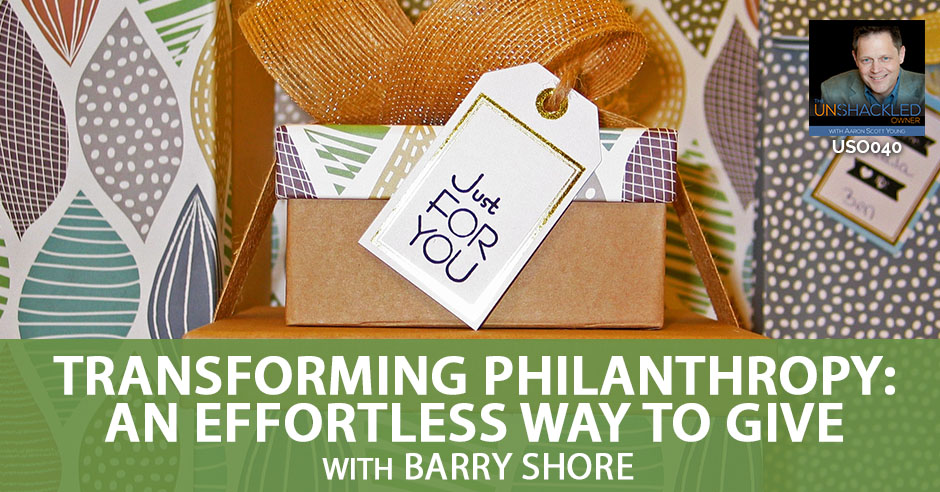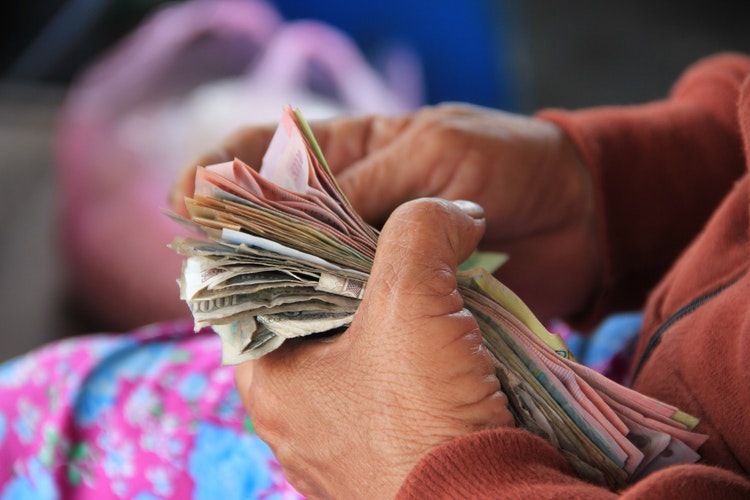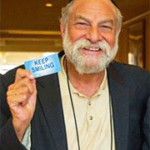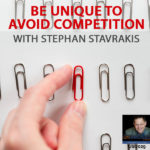 For Barry Shore, founder and CEO of Dlyted, believes imparting anything to anybody listening is a key strategy in life and success. Just as Uber has transformed transportation and Airbnb has transformed hospitality, Dlyted is transforming philanthropy. Dlyted enables you to shop, earn and give effortlessly to your favorite cause by using e-gift cards. Dlyted is the result of Barry’s fight and recovery from Guillain-Barre syndrome, a neurological disorder that left him a quadriplegic. Through resilience and determination, Barry was able to walk again and live a full and satisfying life full of love and peace.
For Barry Shore, founder and CEO of Dlyted, believes imparting anything to anybody listening is a key strategy in life and success. Just as Uber has transformed transportation and Airbnb has transformed hospitality, Dlyted is transforming philanthropy. Dlyted enables you to shop, earn and give effortlessly to your favorite cause by using e-gift cards. Dlyted is the result of Barry’s fight and recovery from Guillain-Barre syndrome, a neurological disorder that left him a quadriplegic. Through resilience and determination, Barry was able to walk again and live a full and satisfying life full of love and peace.
—
I’m glad to be back with you again to have another very interesting conversation with a fabulous entrepreneur that you’re going to love. Before that, I want to remind you that the Magnify Your Wealth Summit, my event that I do twice a year, is coming up on May 17th, 18th and 19th down in beautiful San Diego, California at the Dana Resort, right on Mission Bay. It is a stunning place. We always sell out. We’re having a great opportunity, but I love new people to be there. If you want to learn how to expand your wealth in ways that maybe you haven’t even learned about yet, if you want to know how to build corporate structures around that so that you can protect everything you are building or if you’re at the early stages and you’re trying to get organized so that you can make sure that what you’re building is built on a solid foundation, you got to come to this event. I’ve got some of the top legal and accounting minds in the country, I’ve got some of the great wealth advisors in the country, and we attract many wealthy people.
We always have a contingent of people who have a net worth north of $100 million, lots of business owners, and some people that are getting started who would like to rub shoulders with people who are ringing the bell and really making a difference, who have become unshackled owners. I invite you to come and join us May 17th, 18th and 19th in San Diego at the Dana. If you want to learn more, you can go to www.Growing28.com. If you decide you want to jump in, when you go to the purchase page, put in the promotion code Expo, that’s my personal private promo code to give you. Even though we’re well past the early bird pricing, you’re going to get the lowest possible pricing that we offer for this event. It’s a three-day event. We feed you beautifully. We take you out on a cruise on Mission Bay and out into the ocean if the weather’s calm, and you get to have private appointments with these legal and accounting and financial geniuses and also with my team.
Last summit, we did over 400 private appointments with the people who were in attendance, and we limit this to a hundred people. That means on average, people were having four private appointments to drill down on what you need in your business. That’s why we call it Magnify Your Wealth, and it’s at the Dana Resort on May 17, 18, 19. We want you to hurry up and go to grow in 2018 and check it out, watch the video. You’re going to love the video if nothing else, but go check it out and I’d love it if you would join us there at Mission Bay on May 17, 18, 19.
My guest is a phenomenal guy, and if you were to meet him, you wouldn’t make an immediate connection to the success and the incredible entrepreneurial blockbusters of this guy’s business career. Barry Shore is my guest. We’re going to tell you what he’s working on now. Barry is such a happy, joyful, funny, fun, and goofy in some ways guy that you wouldn’t naturally assume that this was a man who, by the time he was 33 years old, had made millions and millions of dollars personally in the diamond business and built a company exceeding over $100 million. He personally made millions. He took that at the early age in his early 30s and he went into the telephoning business and he built this huge international telephoning company. That made it possible for people way back in the ‘90s to be able to call over seventeen countries for free. He was awarded patents for the technology created, but he’s done all kinds of freaking amazing things. He sold that company for $10 million eighteen months after he started it. It’s still in business today as a $2 billion market cap. He did all those things and then he went through a big tragic point in his life and he rethought what he wanted to do. We’re going to talk about that experience but he’s now running a company called Dlyted. It’s a very funky new agey thing. I said, “Explain to me how somebody could understand Dlyted.” He said, “Just as Uber has transformed transportation and Airbnb has transformed hospitality, Dlyted is transforming philanthropy.”
Listen To The Episode Here
Transforming Philanthropy: An Effortless Way To Give with Barry Shore
I’m very excited to welcome to the show my good friend, Barry Shore.
I am pleased and proud and deeply honored to be speaking with you and these many tens of thousands of people in the audience.
How are you?
I am doing so well that if you could put it in a bottle and sniff it, you’d be happy for a year.
If you look at the thumbnail, the picture that we have of Barry, at least if you go to my website, AaronScottYoung.com, Barry looks like a Jewish cantor, the one who sings the lessons and sings the message in temple. If you talk to him or get his voicemail, it’s very cantor-like. I don’t know, Barry, if that was the plan or if you do that in church and temple.
It happens to be that yes, I do that in the synagogue and some people even like it. It’s my way of expressing from deep within because if we’re not able to sing in our lives, then we’re not living. We’re just grunting. Go get out there and sing.
I love that about you Barry, that every time we chat, no matter if it’s live or on the phone or even before we start, I can’t help but grin from ear to ear because you bring such a joyful energy into everything you do. Has that always been the case? If we go back to your childhood, where did you come from? Where did you grow up? Tell me about where you were born. Where were you born?
I was born in a place called Dorchester, Massachusetts. At the age of nine, we moved from Dorchester to a place called Brookline, Massachusetts, which happens to be one of the most beautiful towns in the United States of America. Very upscale, very well to do, right next door to Boston proper. I grew up literally in the shadow of Fenway Park. I say that because that had a great influence on me, a young aggressive boy, which you can’t be in today’s world, but I was. I’ll tell you why it started me in my entrepreneurial path. Since we’re talking about business, life, joy, and happiness, I’ll tell you two quick stories.

Transforming Philanthropy: The ability to listen to someone else is a key strategy in life and certainly in success in business.
One is at the age of eight. I remember exactly, it was towards the end of January, eight years old, looking out the window in Boston and it was a very rainy, very cold, very dreary snow-field day. I’m looking out the window and said, “What a horrible day.” My Auntie Edie, who was over our house all the time, comes running over to me and says, “What are you talking about? Look at this. It’s raining. You got snow in the ground. Do you realize what that’s going to do to fertilize and make everything green and beautiful and blossom when it’s spring time? It’s wonderful.” I’m an eight-year-old kid and I said, “Huh?” That moment stuck with me. I am now chronologically 69 years old and it doesn’t leave me. I cannot look out a window and be in the world and not see beauty and blossoms no matter what the weather looks like or feels like. I was introduced at a tender young age to joy in life. As an extension of that, when we moved to Brookline, I had the opportunity to the following. I’m going to make everybody jealous because everybody would love to do this. Everybody knows what Fenway Park is, and it’s the Boston Red Sox. I don’t even care if you’re from New York and you can’t stay on the red side. Everybody knows Fenway is one of the great icons of America. From the ages of 12, 13 and 14, this goes back into the 1960,1961, 1962, I got to sell newspapers with scorecards on them outside of Fenway park for almost every Red Sox game for three years as a kid.
I made money. I got to go to baseball games regularly because of those days. The Red Sox are not the Red Sox of today. People would invariably get me tickets to go in and newspaper boys would sneak in sometimes and we were able to sit not in the bleachers, but sometimes I was right up in the dugout area and sometimes, the sky boxes were the first ones to put in and I got paid to be there. That’s really cool. To show you about entrepreneurial spirit and doing things, I had a particularly corner that I sold my newspapers, and they did very well. I can make sometimes $25, almost $28 a night. Remember, I’m a twelve, thirteen-year-old kid, this is 40 years ago, but I realized if you have a newspaper and a scorecard, if you don’t have a pencil, then what good is it? I mentioned it to my dad, who’s a smart guy. He said, “Let’s do the following. Let’s go buy some pencils and we’ll sharpen them.” He was so smart and he said, “You buy a long pencil. What if we cut it in half and double the number of pencils, and sharpen it because nobody needs a long pencil. It’s like the scoring you do when you go to play golf.”
We sold the newspapers where you make pennies, but now I’m selling the pencil for ten cents. Remember, it’s half a pencil. That half a pencil costs me maybe a penny and a half, so it was early introduction into the idea of true commerce and getting out there and hustling. I had also one of the great experiences in my life. I had a particular gate that I sold at. It was in the corner of Van Ness. There was a fellow there, and you can’t do this in today’s world, but the fellow there has this very large cart. I’m talking big, maybe six feet long, four feet wide, filled with peanuts and it was a roaster. He was old. He must’ve been 60. Old, but very wise black man who spoke beautifully, and he sold peanuts.
Here is his call, “Peanut’s a dime. Three for a quarter. $0.15 in the ballpark.” That was his mantra. He would sell and make money, and he instructed me. He said, “Kid, come over here. See what I do? Peanut’s a dime. Three for a quarter. Fifteen in the ballpark. I tell them how much it is, I tell them how they get the best value, and I tell them this is cheaper than inside. I like the fact that you’re selling your pencils, but you should sell it for $0.15 and not $0.10.” I did and he was right. It was a score card without a pencil. What good is it? It’s $0.15. They would give me a quarter usually for the paper and pencil and now you’re making real money. It was so fun. To be able to listen to someone else is what makes this story of interest. It was the ability to listen to someone else. If I can impart anything to anybody, that is a key strategy in life and certainly in success in business. Aaron, you represented almost anybody in the country because that’s what your whole world is about. How can we serve you better with information? I had an idyllic childhood.
I love those stories. I love your young entrepreneurial bent. Your dad’s saying, “Let’s go get some pencils.” You understood it, but your dad was like, “We can do better. Let’s figure it out.” I remember in my first recycling business, we didn’t have much money, and we’re going to put out flyers and we specifically designed the flyers so we could print three of them on an eight and a half by eleven sheet of copy paper, because every copy was expensive to us. We wanted three out of one piece of paper instead of doing an 8.5X11, which was too big anyway. I couldn’t help but be right there with you outside the gate to Fenway Park. Here’s this little kid selling newspapers and an old black guy, back when maybe black people weren’t seen as equally as they would be now, but here’s an older guy selling peanuts and a kid selling papers and you’re both using brilliant business strategy, and the young guy is seeking out the wisdom and listening and experimenting on the counsel from the guy who’s been doing this longer than you, and darn it if it didn’t work.
I want you to be thinking, first of all, are you ignoring great counsel from people because somehow you’ve put somebody in a box and you think, “I need to hear from some big fancy guru who’s got a huge YouTube channel,” versus somebody who’s been working at that darn gate for years and has somehow stayed in business? You have to ask yourself, “How do they stay in business year after year if they don’t know something about what they’re doing? What can we be learning from people all around us?” Then when we learn it. Do we have the guts to experiment on it where you go, “That’s interesting. Maybe later when things are more convenient I can do that?” I’ll tell you, brilliant wisdom and brilliant following counsel by the young Barry Shore. How did these experiences in this idyllic Brookline, Massachusetts youth, how did that translate into becoming a wild success and the diamond business? That’s a big jump from twelve or fifteen years old to your early thirties?
Interestingly enough, I did have other things that I did. Growing up in Brookline, Boston, we have snow. When it was snowing out a lot and there was no school that day, that meant we can go out shoveling and make money. There was always something that we were doing, myself and my friend. As a teenager looking for things to do, I hired other guys to be caddies at the local golf course. The caddy would get $10, most states have a lot of money, I get $15 because I was the guy who ran the caddies. I had six caddies and I’m making an extra $5 in each one and recognizing that’s a good gig. If you give people something that they want, which is, “I’ll give you $10, I’ll take care of all the outreach to the people, make sure you got your ability to carry the bag and you’ll make your $10 and you are happy.” The fact that I make $5 on it they didn’t care as long as you made $10 on it. I kept learning that the more you allow people to get what they want, the better it is for you. Long story short, fast forward, I did very well in high school. I went to a good college called University of Massachusetts at Amherst, and I left in my third year to do what’s called a year study abroad. I decided to go to Europe. To put it in perspective, that was 1969, 1970, and people in my family had been in the diamond business in Europe a generation before that and they came to America. They didn’t do it then, but my mother had worked for a very well-known diamond dealer in Boston, so I always was around the business but never thought of going into it per se.

Transforming Philanthropy: The more you allow people to get what they want, the better it is for you.
When I went to Europe. I stayed in Europe for three years. Your abroad turned into three years, so essentially I was a college dropout. Everybody, you’re getting advice, if you want to use it, from a college dropout. I was living in Amsterdam at the time, which was across the world for young people that were looking and searching for things, and while there, talk about opportunity and fun. While there, I lived with another twelve people in a house and all the things that young hippy kids do, but we needed to eat and make money. What we did, one of the people there is sharp. She was clever with her hands and she was a seamstress. We used to go to the flea market. Don’t think a flea market like here in America, with people’s lawns and things like that. These are, in those days, very large open air markets and we would buy old Belgian rugs.
Belgium had been the center for rug making in all of Europe for a while. They took some things from the Orient and made them as good or better. We take old Belgian rugs that had been stained and caught up in that. We would take the bad parts and use the good part and we would start making things like pillows. Imagine taking a nice round Belgian rug, clean it up a little bit, putting it back on and fill it with foam rubber, and now you have this big cushion to sit on. We would make coats out of rugs and bags and hats, and it was a real business. We’re paid money and we’re able to live in Amsterdam and not have to do anything other than make these things and bring them to the market and sell them. Make money, have fun, and we lived there successfully for three years. Then I came back to America. That was three years and my parents were not very happy with it, but it’s all good. I learned more there than I did in college, but when I came back, I opened up a store on the most fashionable street in Boston called Newbury Street. It’s the Rodeo Drive of Boston and very upscale and hip. We had a company, a very clever name for the store, and a great sign. I brought in a container load of Belgian rugs and hired some people, some seamstresses, and started making things again, the pillows, the coats, and hats. Long story short, we got written up in magazines and some very hip people like Cheech and Chong, if anybody remembers those guys. They were performing Boston. They heard about the store. They came in and they bought hats and they bought some stuff for their friends back in Hollywood and it was a great success. They had a lot of fun and we made money.
The diamond business and the garment business?
With the garment business, I had an interesting dilemma that I got involved in an automobile accident and unfortunately, I had to close that down, but suffice to say when I was looking to do things, I had heard about a school called the GIA, Gemological Institute of America. It was the most famous place in the world for learning and studying about diamonds, and I said, “I’m going to apply,” and they accepted me.
There were two places. They had one in New York and one in Los Angeles. Los Angeles is the headquarters. I said, “Am I a dummy? Do I have to live in Boston in the cold weather for the rest of my life?” No. What I did is I went back to school, I only had half a year to finish up, I graduated with a double degree in economics and history, and I drove across country. I came to Los Angeles, California in 1975 and have been here ever since, met my wife after a couple of years, had a wonderful son and beautiful grandson, families, and all greatness came out of that one decision to say, “I’m out of here. Time to move to a place that’s warm and loving and inviting and a new career entirely.” From that, I came here in 1975, by 1980, I was worth millions of dollars. I’d sold over a hundred million dollars’ worth of diamonds, the market was booming, but still, all you got to go out there and hustle. I decided to retire at the age of 32. Then the next chapter begins.
I love all these little entrepreneurial stories. What’s great so far is that you see an opportunity and you go, “I wonder what we could do with this. We’re here with all these Belgian rugs. What else could this fabric be used for besides walking on?” It was a perfect time. There was a lot of hippie clothing, was heavier, and had that North African vibe to it, that whole Moroccan look to it.
It was a perfect time to take this very heavy and very luxurious stuff and go, “It’s not perfect as a rug anymore, but 90% of this is good. Let’s do it.” There’s so much opportunity. Everybody’s looking for this one magic little seed that they’re going to find or somebody who’s going to hand it to them if they do their $40,000 program or something, and then if you plant that seed and put a little of your water and a little veer tears on it, that it’ll spring into some big fortune. That’s almost never how it happens. It’s almost always looking for opportunity in this stuff all around you and say, “What could we do with this? What could we do with this stuff that’s available to us?” People think they’ve got to go out and spend $50 million or $100 million or $200 million dollars to get something going.
I’ve bootstrapped every single thing I’ve ever done. I’ve never gone out and asked for money from anybody. People come to me all the time and say, “If I could get an investor for half a million dollars, then I could launch my magical idea.” I’m thinking if your idea has merit, people will buy it. If you’re going to be, “Let’s start a car company like Tesla,” you’re going to need a lot of money. If you thought “I’d buy McDonald’s franchise,” you’re going to need the money, but most of us can take a very small amount of money, and if we’re creative, we can come up with something interesting and fun to do. I don’t know about your experience, but most of my career has been what I call failing forward.
The key elements in all of this is number one, you can’t fail. Even if you think you did once, so you do it again. Everything I’m telling you, all these stories, did I have times where it didn’t work so well? Absolutely, so we kept trying. Never give up, because you will succeed. If it’s not this, it will be something else, and you never know what doors are going to open when you walk through one. They’d be seen by others and people will come to you. What you need to do is keep looking, doing, growing, and have that absolute knowledge that you are in full control and you cannot fail. You will succeed.
Walt Disney was turned down by over 200 banks for Disneyland to go finance Disneyland. Henry Ford, ninth wealthiest person to ever walk the planet, seven failed businesses and a couple of bankruptcies before Ford Motor Company. You’ve got to keep trying. Sometimes we run into some adversity and that happened to you along the way. Tell them about when you got sick. Tell us that whole story of having your whole world turned on its head, and then how you didn’t give up even though you had every reason to.

Transforming Philanthropy: What you need to do is keep looking, doing, growing, and have that absolute knowledge that you are in full control and you cannot fail.
I had built two Internet companies, one of which is sold for millions of dollars and is still a going concern and very successful. The other one we had gotten funding and then the Internet bubble burst.
I’m sorry that I said you don’t need to go out and get money. There is nothing wrong with going out to get money.
You’re right, though. If you start something and it starts growing, money is always looking to make more. You will attract people rather than having to run after. You do need to hustle, but never in the sense of being needy, always in the sense that you have something that is valuable. That’s what you must present yourself. Here I am, I’m now 55 years old, I had come out of retirement to help my friend’s parents and their friends owned a very large successful real estate company. They had over 20,000 apartment units and millions of square feet of commercial space. It was the early 2000’s and there was a thing called broadband happening. Dial up was moving away, broadband was coming in, and they had all these apartments. What are they going to do? What are all these cables and these high speed and they didn’t know anything about it. I had been involved with Internet for the past few years and have done very well, so they asked me, “Come out of retirement and work with us.” Thank God I did and I negotiated a contract with Time Warner, Corvette, AT&T and made them millions of dollars. I did well myself and everything is rosy and beautiful.
Then September 17th, that was a Friday morning, 2004, I’m standing up like I hope. I am hardy, healthy, happy, 55, strong, and capable. That night, I was in the hospital paralyzed from my neck down and it was not from an automobile accident. It was a very rare disease called Guillain-Barre Syndrome, GBS. Imagine that. I went from being fully capable to all I could move, as my doctor was fond of telling his friends, when he met Mr. Shore, all he could move was his mouth. Nothing else on the body worked. Imagine a change of life.
Thankfully, you’re very good with moving your mouth. You’re a great speaker, but I can’t imagine being able to not move. You are paralyzed neck down.
From the neck down. It’s called quadriplegic. I’ll illustrate with one story. It might give everybody a little sense of something and then I’ll urge you all to do something for eight seconds after this. Here’s a quick story. I was in the ICU for eleven days. Back in the baseball cards statistics, ICU for eleven days, four and a half months in rehab hospitals. I was in a hospital bed in my own home for two years. I could not turn over by myself. Four years in a wheelchair, braces on both legs, my hips down to my ankles, and that was an improvement. Today, thank God I’m vertical and ambulatory, albeit with the help of a six and a half foot walking wand made for me by Zen Master, but I still have help twelve hours a day, seven days a week. I can’t even walk up a stair by myself or a curve, but as you hear, I am robust and capable and certainly in my mind, fully functional.
All those statistics are fascinating and terrifying. The whole time I’ve known you, which is two, three years, you’ve been walking with that staff. I didn’t know that you couldn’t go up a step or a curve. I’ve been with you at events and in ballrooms. We’ve never gone hiking together or even gone from the parking lot into the building, but my point is there’s nothing in the way that you present yourself that seems infirmed. You seem like a locomotive coming into the room. You’re all power, you’re in control. While you’re lying in that bed, you can’t even turn over for a couple of years on your own, four years in a wheelchair. What got you from flat and not able to move? How much of it was mindset? How much was it a miracle cure? How much of it was you going against what the doctors were telling you and finding your own solutions to problems? What did it take for you to get to be ambulatory and moving on your own?
Without being glib, because I’ve answered this question before, PTL. Prayer, therapy, and love, and in powerful, positive, proactive ways on each one of them. Prayer on a regular basis, daily. Therapy, as you can all imagine, but it may be pretty hard to think three hours a day, six days a week of people moving your arms and legs and trying to get some feeling back into them and working them. Despite some doctors with great bedside manners who said, “I don’t think you’re going to walk again,” and others, mostly therapists, who say, “We’re going to get you up Mr. Shore. We’re going to have you vertical. I don’t know if you’d be walking, but you can do it.” In my mind, I always saw myself walking, albeit maybe not running and maybe not walking in the way I used to, but vertical and ambulatory.
Love, I cannot emphasize enough. This applies to business as well as to healing. Love, both receiving and giving. It is so important that in your life you have relationships, deep, powerful, wonderful, and giving relationships with people because that will sustain you. There will be difficult times. I’m going to say two things here. One is the following. One of my neighbors is an aquatic therapist. It means he does therapy in the water for people. I do believe that he is the best aquatic therapists United States of America. He comes running over to me, sees me in the wheelchair one day, my wife was out pushing me. He says, “I’m going to get you up and walking within a year.” I will fast forward and tell you that didn’t happen. However, he got me in the water and with the help of two or three therapists and what they call floaties on my legs and on my tummy and my arms and started moving me in the water, within about eight months to a year, I was able to move my arms over my head and do what people would call a backstroke in the water. They were able to remove the floatie from my tummy, I could give that up. The legs needed it because otherwise they sink.
I live in Southern California. I have a beautiful tan and an outdoor swimming pool, and I’m doing the backstroke. I didn’t want to stop and I kept doing that backstroke. Over the course of almost two hours non-stop, I swim a mile. I wasn’t doing that when I was civilian. Somehow coming out of being a quad, my arms are moving. They couldn’t believe it. The first three times I tried to do a backstroke, the body didn’t even move. The arms are moving, but the legs didn’t move. Over the course of the next few months, I started swimming a mile three times a week. I loved it, and I got that down to an hour and a half instead of two hours. I’m not stopping so I’m doing something. After about eight months or so, I thought I’m going to turn on my belly and swim and do what they call a crawl. A regular stroke.
Are you thinking about how brave that would be when you’re feeling limited in your ability to control all of your limbs to have that face down?
My doctors and therapists were nervous, “Mr. Shore, you might drown.” What we did is I have floaties on my legs to keep them up and I have paddles on my hands because my fingers were closed, and I’m using a snorkel so I don’t have to worry about turning my head and breathing and such. Now I’m going to amaze everybody. I started swimming on my tummy and it took about an hour and a half the first time to do a mile, but I am perseverant. I do not give up. I wanted this because I believe it’s going to be great for the mind, for the heart, and for the whole being. I’m going to fast forward over the course of the next six, eight months. I was able to swim a mile. I did it six times a week, and then I started doing a mile and a half, and then I started doing two miles. I’ll fast forward to the end. I now swim two miles a day, six days a week, and I’ve done that for more than nine years. I’ve accumulated enough miles to swim from Venice Beach, California, where I live, to Hawaii and from Hawaii to Taiwan, Taiwan to Shanghai, China, more than 6,603 miles, and still going.

Transforming Philanthropy: If you start something and it starts growing, money is always looking to make more.
The key to this is PTL: prayer, therapy and love. It’s based on one of the greatest teachings that I’ve ever learned from a dear, amazing rabbi who at the time was 86 and I was 42. That’s already a long time ago, called the Four Ps. The Four Ps will stand everybody in good stead for your life. The Four Ps are purpose, prayer, perseverance and patience. When you incorporate the Four Ps in your life, there is nothing and no one that in any way hamper you, hinder you or stop you. You will be successful. Purpose, prayer, perseverance, and patience, both with yourself and others. It’s oftentimes more difficult to be patient with oneself than others, but they’re both necessary.
When you’re out there up and walking and stuff, you’re talking about how to make a difference in the world through philanthropy. Will you tell us about Dlyted and how it’s transforming philanthropy as you said, like Airbnb is doing for hospice? I’m a big Uber and a big Airbnb fan. Tell us about Dlyted.
Thank you for the opportunity. When you’re someone like me, a clod, laying on your back, you can’t move a thing, you can go mad. I went mad but not like you’re thinking right now. Mad stands for make a difference. I realized that I had done well in business. I had friends, great family, all the things that everybody would want, but I was always giving, but I wasn’t a giver. I needed to make a difference in my life. The good Lord said, “Mr. Shore, you’re paralyzed. What are you going to do now?” Make a difference.
I’ll give you the quick story. I mentioned to you I was in a wheelchair for four years and we had two primary wheelchairs, one of those electric ones, and a very lightweight what they call Olympic style wheelchair. Together they cost over $10,000. Thank God we can afford it, and the real lightweight one is important because even though I did therapy at home three hours a day, six days a week, it is important to go to group sessions with other people who have issues. Once a month, they pick me up in the wheelchair, they’ll put me in the car, get me there, take me out, pick it up, move on, and do it. We had this lightweight, which costs a lot of money, but that’s okay. We’re in the group session and I noticed people don’t have wheelchairs like I do. They can’t afford it.
I came home one time, they put me back in bed, and I asked my wonderful wife, Naomi, who I’m married to 40 years, but at the time was about 27, 28 years and center. I said, “Can you do me a favor and find a place that helps people get wheelchairs and let’s give them a thousand dollars and help out.” She says, great, fine. Walks out of the room. Five minutes later I call out, “This is dumb.” My wife comes running in and says, “What’s the matter with you?” I said, “This is crazy. Just because I’m moved and we have the money to give, why aren’t there thousands, tens of thousands, millions of people who are giving money every single day to causes they care about? Why isn’t that done?” She looks at me and says, “You’re smart. Figure it out.” She walked out the room.
She says you have time. You’re just hanging out.
You’ve got time, you’ve got brains, go figure it out. I asked the good Lord and said, “Here are the perimeters. It has to be fast, it has to be fun, it has to be easy, and it needs to be free.” What does that mean? It means that people should be able to give money and it doesn’t cost them a penny. The two internet businesses that I had built and sold, one that we sold, were both built on a free model. You could call seventeen countries in the world for free. You could send and receive faxes for seventeen countries in the world for free. Free is a big draw. Everybody likes free. Those are the parameters. Fast, fun, easy, and free. I said, ‘Dear Lord, please help.” Nothing happened right away.
About two days later, after an especially exhausting session of physical therapy, which usually went an hour and a half in the morning, and hour and a half in the afternoon, they put me back in bed, I’m tired. I want to close my eyes and I did all of a sudden my eyes opened up and I see this amazing vision, three circles intersecting. A Venn diagram, like the Olympics. Not only with three circles, they’re all labeled. When you label things and you see it in a simple way, the most difficult questions, if you have a simple effective answer, that’s the best. The first circle was labeled mobile, which is cell phone. You’ve got to remember back at that time, that was the first or second year of the iPhone. I realized that’s not a trend or a fad, that’s a complete disruption in human communications. This is real. That’s the first one.

Transforming Philanthropy: It’s oftentimes more difficult to be patient with oneself than others, but they’re both necessary.
The second circle was labeled gift cards. That’s interesting. Everybody knows what they are. You can’t walk into a store and not be assaulted by racks of these things. It’s $100 billion business but those are plastic. What does that mean? The good Lord said, “Here’s an arrow moving from gift cards over to mobile and it was labeled digital. I hit a button on my phone, I want $50 at Starbucks, and it’s only $50. That’s pretty cool. In your case, Aaron, give me a $500 worth of Airbnb and we send it to you done in a matter of seconds or Uber. We have 500 of the biggest brands in the country. The third circle was the most important. That was labeled cause. You oftentimes learn more about what’s not said than what is said. It wasn’t labeled charity. The charity in my mind conjures up a person with their hand out, and you put a dollar in the hand and the next thing you know the hand wants to reach into your pocket and get more. That’s a charity. A cause is something attractive. “I want to help, I want to have clean water, clean environment. I don’t want pets to be put down. I want to save elephants for the next generation. I want to make sure there are homeless shelters.”
It all costs money but what if you could do this? You get a button on your phone, give me $500 worth of Airbnb, it comes 38 seconds later and you paid 500, you’ve got $500, and $25 went to the cause of your choice. It didn’t cost you a penny. Taking everyday situations, you know you’re going to go to Starbucks or places like that. Give me $50 and you hit it, it gives you $50, paid $50, and a buck and a quarter went to your cause. Now we had the process. Now I could see the mission and the goal. Remember, I’m going mad. I need to make a difference. What’s the mission? Making every day giving effortless. What’s the glow? The big hairy audacious goal? To give $1 billion without costing any giver a penny. How’s that for a while from a guy lying in bed and can’t move anything on his body.
We contacted, we attracted, I told my story, I told the vision, the mission and the goal to a number of people and friends and people wanted to help. This one was a retard Google executive. This guy was the former president of a billion-dollar gift card company. This woman was involved in the creating all the UI/UX, the gap and we had some investors who came and said, “I want to change the world of giving. Why can’t people give every single day? Does it cost them a penny? Give billions without costing you a penny, and it’s easy and it’s fast and it’s fun?” Thus Dlyted was born. Dlyted.com literally enables causes and people to raise money and it helps the brands also. The brands love it because that’s the arbitrage. They’re willing to give something away. You see these things in the store. The store makes money selling him. We take that percentage, and we give it to you to give to a cause. How wonderful is that? I don’t need the money. I only make enough to keep the business going. There you have it, the ability to give at no cost.
They just go to Dlyted.com and they can see. You got everything from Starbucks to Disney.
Uber, Airbnb, iTunes, AMC theaters, and pizza and all the stuff you want. It’s all delivered electronically in seconds. It doesn’t cost you a penny more, and now you’re helping.
It’s called the Law of Reciprocity. Basically, to get what you want, you also need to be a giver. That’s what Barry was discovering. That’s what he seen prove out over and over again. I’ve seen it. The laws of I grew up in the church that I grew up in, we always talked about the law of tithing and we’ve made a point of supporting causes and giving money, and that comes out of our discretionary income. We have this, we’re going to give 10%. How cool is it that you can go to Dlyted.com and you can buy stuff you want to buy anyway and for the price you’re going to pay anyway and have a percentage of a lot of your discretionary spending going back to help causes. As I understand, if you can direct enough business, you could even figure out what you want to aim the money out.
Most of the time, people come in because they’ve been directed by cause, American Cancer Society, or their supporters use Dlyted, the local pet shelter in terms of that. We have people come in because they just heard about us. By the way, there could be thousands of people on this call right now that say, “I have a cause that I care about. I should tell them about it.’’ We will do all the heavy lifting, will put up the cause page, we will build everything, so now they can start sending out.
There are two pieces to see that are so wonderful. One is the deep philosophical, one that you touched upon. It’s not so much always how much you give. It is the fact that you give. Becoming a giver consciously transforms the being. It nobles your life. That’s what life is for. We, in the United States of America, especially are so blessed with the most giving people in the world. Our basis of outlook in life is knowing that we’re here to be of service or to help. That’s one. The second is that we touch the two deepest emotions in a human being. “I’m smart and I’m good.” How much smarter can you be than do good and not cost you a penny.
There was a very famous study that was done in 40 years or more ago of the things that people hate or fear the most. Number three was dying. That was number three. Number one was fear of public speaking. You don’t have that particular issue. I don’t, but people loathe speaking in public, especially in front of the peers. Number two though is asking other people for money. Watch Dlyted is. You can now tell your 100, 200, 500 people in your social media, “Go to Dlyted.com and click on Save the Whales. It won’t cost you a penny to give.” You can freely talk to the people, asked people for help and it doesn’t cost them any money. You’re smart, you’re good, and we’re changing the world of philanthropy and changing the world of giving. This is the digital age. Get with it everybody. It’s a new time. We can do this.
I love it, and this is why I wanted to have you on. Go check out Dlyted.com. Learn about Barry Shore. See how he can help your cause and your thing that tugs at your heartstrings to get the money it needs, but also I want you to get to know this man because he’s a brilliant business mind who just keeps seeing things that are around him and figuring out a way to leverage those things, those things that could be often overlooked, that could turn into a gigantic movement and make a huge difference. He learned how to do it for himself. Now he’s doing it for others. That’s Barry Shore. Do you have any book that you recommend people read?
I can tell you a book that I read every single day that has helped me. The Psalms.
The Psalms of King David?
That’s right. You can read it in English and in any language that you want because it speaks directly to you. It is about the human struggle, it is about the ability to live in this world in the most gracious and positive way. King David suffered things that nobody should ever know about, his own son tried to dethrone him and kill him. He had difficulties with other children, he had difficulties with his best friends, but always focused on the good. As I am wanting to do in my particular podcasts which are called MOL, Moment of Love, I do one in the morning and I sent it out. I send it out to a number of thousands of people. My opening line is the following. “Good morning, beautiful bountiful beings and good-looking people. Remember, you’re good looking because you’re always looking for the good.”

Transforming Philanthropy: Do what you can, with what you have, from where you are.
I love getting those recordings and I appreciate you doing it. Do you have any final words of wisdom for the people as we wrap up this episode of the Unshackled Owner?
Let me leave you with this. Do what you can, with what you have, from where you are.
Barry, thank you for being on the show with us. I appreciate you being here. Folks, you’ve got a lot of food for thought. I want you to go out and think about what are the opportunities and how can you do what you can with what you have from where you are, whether that’s selling newspapers out in front of the Fenway Park or it’s building a way to give away a billion dollars to causes that need our help just through our simple acts of spending that we’re doing anyway. We’ve heard from a brilliant business mind. I want you to take these things and experiment on them. You don’t have to make a lifetime commitment, just try them and see what the results are. When you learn new and interesting ideas and you experiment on them, you will start to find the things that work for you. As you start to gather all those things that work together, that’s the beginning of becoming an unshackled owner.
About Barry Shore
 Barry Shore is an ambassador of Joy. Because of his successes in business and recovery from full body paralysis he has built an “Eco System of Good” internet platform that enables people to Give to their Favorite cause at No Cost. Barry was an instructor in the Diamond Program at the GIA, an author of a world wide resource book on diamonds and an international wholesale diamantaire with sales exceeding 100 Million dollars. After a brief retirement at age 33 he returned to business and built an international telephony company. From this grew an innovative process in 1999 that enabled faxes (sic) to be sent and received via email (think dial up) to 17 countries for FREE (!). Barry was awarded Two Patents in this space and built a stellar executive team. He then sold the Company 18 months later for more than $10 million dollars and the acquiring Company is today a $2 Billion market cap.
Barry Shore is an ambassador of Joy. Because of his successes in business and recovery from full body paralysis he has built an “Eco System of Good” internet platform that enables people to Give to their Favorite cause at No Cost. Barry was an instructor in the Diamond Program at the GIA, an author of a world wide resource book on diamonds and an international wholesale diamantaire with sales exceeding 100 Million dollars. After a brief retirement at age 33 he returned to business and built an international telephony company. From this grew an innovative process in 1999 that enabled faxes (sic) to be sent and received via email (think dial up) to 17 countries for FREE (!). Barry was awarded Two Patents in this space and built a stellar executive team. He then sold the Company 18 months later for more than $10 million dollars and the acquiring Company is today a $2 Billion market cap.
Then he built a predecessor to Skype (enabling people to call to 17 Counties for FREE) which was funded and then bought within 9 months by a NASDQ company.
Then 17 September 2004 Barry became a quadriplegic (paralyzed from his neck down!) overnight from a rare neurological disease (GBS). His journey since to regain mobility caused him to GO MAD: Go Make a Difference.
He envisioned a Platform that enables People to GIVE Money to their Favorite CAUSE at No Cost to the Giver and attracted smart caring talented successful players to build the System. He has been granted a Patent in the process and has found the Formula to Create the “ECO System of GOOD”: where Supporters, Brands, Causes All Participate for Mutual Benefit. Barry’s Mission is to Make Everyday Giving Effortless and his Big Audacious Goal is to facilitate the Giving of One Billion Dollars without costing any Giver a penny. He is the Founder of the KEEP SMILING Movement (thedailysmile.com) which has distributed more than 1.2 MILLION KEEP SMILING Cards throughout the world in 27 languages. He is the Founder of the MOL (minute of Love) Podcast produced 6X/week. He has become an avid swimmer (2 miles/day/6x/week) and has accumulated enough miles over 9 years to swim from Venice CA (his home) to Shanghai, China. Barry is focused on transforming the giving space.
Links Mentioned
- AaronScottYoung.com
- The Unshackled Owner Twitter
- The Unshackled Owner Facebook
- Aaron Scott Young LinkedIn



